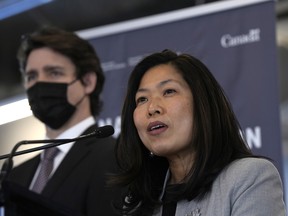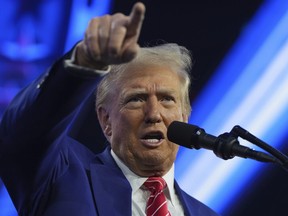‘WTO members have for the first time concluded an agreement with environmental sustainability at its heart’
Article content
The World Trade Organization reached a string of agreements Friday after nearly a week of intense negotiations, showing the international community that the regulator still has staying power after facing years of criticism that threw its relevance and necessity into question.
Advertisement 2
Article content
The 164-country WTO reached several agreements over the course of the 12th Ministerial Conference that began on June 12, including the removal of intellectual property protections for COVID-19 vaccines so that countries can make generic versions of the drugs. Members also committed to ensuring “timely” notifications of trade disruptions in the case of COVID-19 or future pandemics.
“Today is a good day for the international trading system,” Trade Minister Mary Ng said.
The WTO had previously cancelled the conference in 2020, a meeting that must happen every two years as outlined in its rules, due to the COVID-19 pandemic. It was an inopportune time because of growing tensions between two of the organization’s biggest members: the United States and China.
Advertisement 3
Article content
On top of that, former U.S. president Donald Trump refrained from reinstating American judges on the WTO’s appellate body, effectively rendering it useless. The appellate body was critical to Canada during the early 2010s when it ruled in the country’s favour against the U.S. for placing country-of-origin labelling rules on Canadian beef, a decision the Canadian Cattlemen’s Association said cost the domestic industry more than $1 billion.
During the conference, members reached an agreement to reform the trade organization and have a fully functioning dispute settlement system by 2024.
It’s welcome news, said Carlo Dade, director of trade and investment at the think-tank Canada West Foundation. However, he said there is a lack of penalties if the settlement process isn’t resolved come the next ministerial conference.
Advertisement 4
Article content
“At the end of the day, you’ve got a trade agreement amongst almost all the countries in the world,” Dade said in an interview.
Minister Ng said the resolution to create a fully functioning dispute system will be helpful to Canada, since two-thirds of the economy is based on trade.
-

Canadian exports edge up in April on seafood and motor vehicles
-

U.S. hits back at Canada’s dairy rule changes by launching second trade dispute
-

Mary Ng walks out on Russian counterpart at APEC, signalling a shift in global co-operation
“It’s very important to Canada,” she said, particularly concerning the issue of tariffs on Canadian softwood lumber to the U.S.
WTO members also scratched out a deal to curb harmful fishing subsidies that lead to stock depletion, an agreement that has taken more than 20 years to reach.
Advertisement 5
Article content
“WTO members have for the first time concluded an agreement with environmental sustainability at its heart. This is also about the livelihoods of the 260 million people who depend directly or indirectly on marine fisheries,” said the organization’s director-general, Ngozi Okonjo-Iweala, during closing remarks.
Amid the fighting in Ukraine, which has threatened the global food supply, the WTO passed a deal that would allow the United Nations’ World Food Programme to source food from countries even if there’s an export ban or restrictions on them.
“Think about this as a package of very strong negotiations that culminated in an agreement in each of the areas that Canada (cares about),” Ng said.
• Email: bbharti@postmedia.com | Twitter: biancabharti
Advertisement
WTO reaches agreements on dispute settlement system, fishing subsidies
2022-06-17 19:23:21






